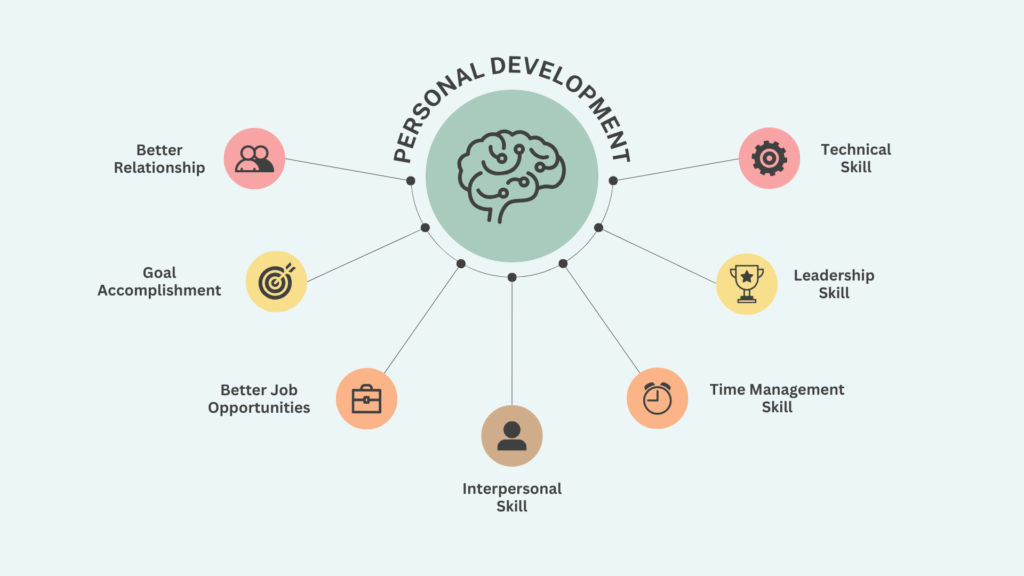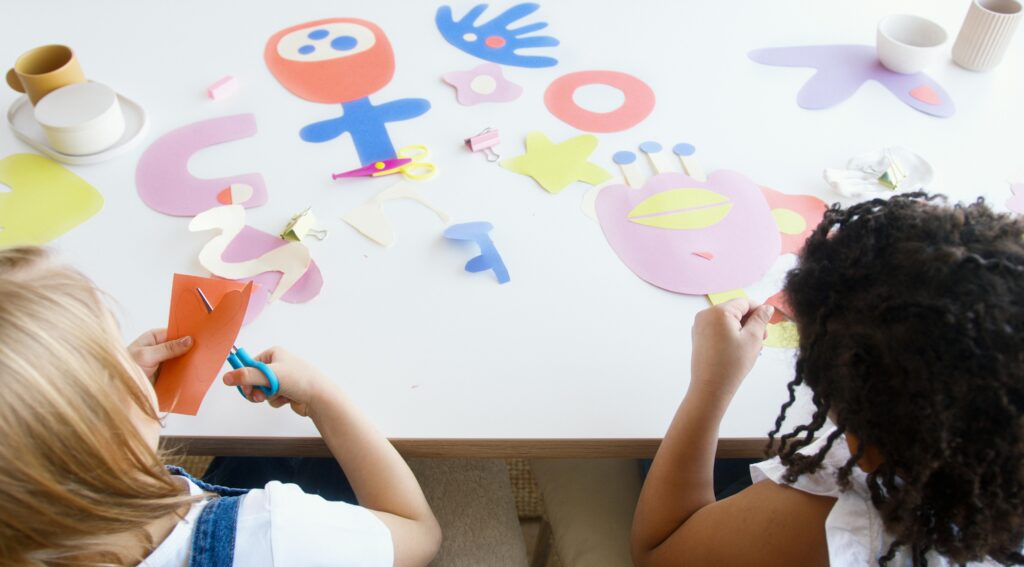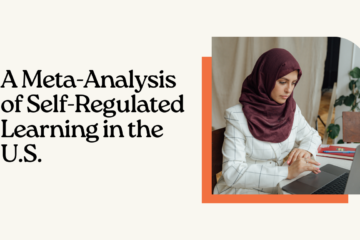Increase Self-Belief and Achievement
1. What is personality development, first of all?
Peresonality Development is a process of enhancing one’s behavior, attitude, and overall outlook towards life. For students, investing in personality development early can lead to lifelong benefits. It helps in building confidence, improving communication skills, and developing the kind of discipline needed to succeed academically and socially.
2. The Value of Students Personality Development
The significance of personality development must be understood by students who wish to develop holistically. Students can better equip themselves to dace obstacles in their acadmic and personal lives by cultivating character attributes like resilience and self-confidence.
The importance of personality development for Students
- Boosts Confidence: Self assurance is essential for both social and academic success.
- Enhances Social Interaction: Cooperation and teamwork are encouraged by strong interpersonal skills.
- Encourages Positive Thinking: Students who have a positive outlook are better able to cope with stress and setbacks.
- Promotes Self-Discipline: Discipline is promoted by effective personality development, and this leads to improved time management and study habits.
3. Tips for Students on Developing Their Core Personalities
1. Increasing Confidence in Oneself
The development of self-confidence is a few of the main comonents of personality. Students frequently experience self-doubt, particularly during trying circumstances. The first step in building confidence is recognizing one’s strenghts and persistently addressing one’s shortcomings.
Advice for Developing Self-Belief:
- Make sure yours goals are attainable by breaking them down into manageable chunks. Every little accomplishment will boost self-esteem.
- Repeated positive statements, such as ” I am capable, ” might help you feel more confident.
- Face Challenges: Regularly venture beyond of your comfort zone; each success gradually boosts your self-confidence.
2. Improving Communication Capabilities
Proficiency in communication is crucial for both academic and professional achievment. In addition to helping students better express ideas, strong interaction additionally promotes greater comprehension of others.
How to Get Better at Communicating:
- Active Listening: is paying close attention before answering. Respect and increased comrehension are fostered by this behavior.
- Become a member of speaking groups: Toastmasters and other organizations provide a safe space for students to exercise public speaking.
- Brevity and Tranparency Practice: To pervent misconceptions, speak succinctly and clearly.

4. Essential Personality Development Advice for Learners
1.Developing an Unbeat Attitude
Students approaches to problems and relationships can be changed by adopting a positive outlook. This way of thinking improves overall health and lowers stress.
Methods for Developing a Positive Attitude:
- Practice Gratitude: Keeping a gratitude diary can help you focus on the good things in life rather than the bed, which will make you happier overall.
- Be in a Positive Enviroment: Aviod nagative influences that sap your energy and spend time with people who are kind.
- Remain Solutions-Focused: Concentrate on identifying solutions rather tha moping over issues. This startegy promotes resiliency and an optmistic outlook.
2. Developing Compassion and Social Skills
Building solid relationships and working well in teams, particularly in collaborative settings, require social skills. Empathy training improves interpersonal abilities and allows students to relate tp others more deeply.
Methods for Increasing Empathy and Social Skills:
- Active Listening: is demonstrating respect and fostering trust by paying close attention to others without interjecting.
- Do Group Activities: To get experience working in a team enviroment, join clubs, volunteer organizations, or study groups.
- Develop Empathy: Attempt to comrehend the viewpoints of others, as this pormotes respect for one another and improved interpersonal interactions.
3. discipline and Time Management
For students to balance their education, other interests, and pesonal lives, time management is essetial. It improves student achivement by preventing procrastination and maintaining organization.
Advice for Efficient Time Management:
- Utilize a Planner: Prioritize the most crucial activities first and set weekly or daily objectives to help you stay organized.
- Use the was Method: To keep attention and reduce stress, split your study time into concentrated periods (e.g., 25 minutes) and intersperse them with brief pauses.
- Establish Clear Boundaries: Limit phone and social media use and create a seprate study area to help you avoid distraction during study time .
4. Creating a Growth Mentality
Adopting a growth mindset promotes continuos development and helping students overcome obstacles with tenacity.
How to Develop a Growth Mindset:
- Learn from Mistakes: Instead of seeing failures as setbacks, consider them as teaching moments.
- Celebrate Little Victories: To keep yourself motivated, celebrate even small achievements.
- Seek Constructive Feedback: To hone your abilities, welcome criticism.
5. Capabilities for Leadership
Anyone who want to encourage and inspire others can benefit from having leadership abilities, not simply those in postitions of control. Gaining leadership experience as a student can lay the groundwork for future success in the classroom, in the workplace, and in one’s pesonal life.
Methods for Developing Leadership Capabilities:
- Take Charge: Offers your services for group initiatives or student council roles to gain experience making decisions and taking responsibility.
- Set a Good Example: Be accountable and dedicated, and others will be motivated to follow suit.
- Gain Expertise in Resolving Desputes: A key component of goof leadership is the ability to resolve conflicts amicably and professionally.
5. Practical Exercises for Personality Develoment
Putting Personality development into practice through exercises can make the process more engaging and impact-ful. Here are some exercises that students can integrate into their routine:
- Daily Reflection Journal: Write down three things you learned each day and reflect on how these experiences can help you grow.
- Role-Playing for Communication: practice speaking in different scenarios to build confidence and adaptability in communication.
- Random Acts of Kindness: Aim to do something kind daily-this builds empathy and positive interaction skills.
- Goal Visualization: Visualize short and long-term goals to stay motivated and focused.
- Public Speaking Practice: Record yourself speaking on different topics improve public speaking skills and reduce anxiety.
6. Tips for maintaining Consistency in Personal Growth
Staying consistent with personality development efforts can be challenging, especially for students with busy schedules.
Here are tips to keep you on track:
- Set clear, Achievable Goals: Break down large goals into manageable steps to maintain steady progress.
- Reward Yourself: Celebrate milestones to stay motivated.
- Reflect on Progress: Regularly assess that you’ve achieved and areas where you can improve. This helps keep you aligned with your personal growth objectives.
- Stay Accountable: Share your goals with a friend or mentor who can help keep you accountable and motivated.

7. Recources and Tools for Student Personality Development
Utilizing resources designed for pesonality development can enhance learning and provide structure.
Here are some useful tools and resources:
- Books on Personal Growth: Books like Atomic Habits by James Clear and The Power of Positive Thinking by Norman Vincant Peale are exellent resources.
- Apps for Self-Improvement: Apps like headspace for mindfulness, Duolingo for language learning, and Habitica for habit tracking can support growth.
- Personality Development Courses: Websites like Coursera and Udemy offer courses focused on personality development, communication skills, and leadership.
- Social Clubs and Workshops: Engaging in extracurricular activities like debate clubs or personality development workshops provides practical experience.
8. Conclusion: Start Your Personality Development Journey
Personality development is a continuous journey that allows students to build confidence, improve communication skills, and prepare for future challenges. By focusing on consistent growth, setting achievable goals, and academically and personally. Start with small steps, and remember that growth takes time and patience. Embrace the process and enjoy the transformation.




0 Comments